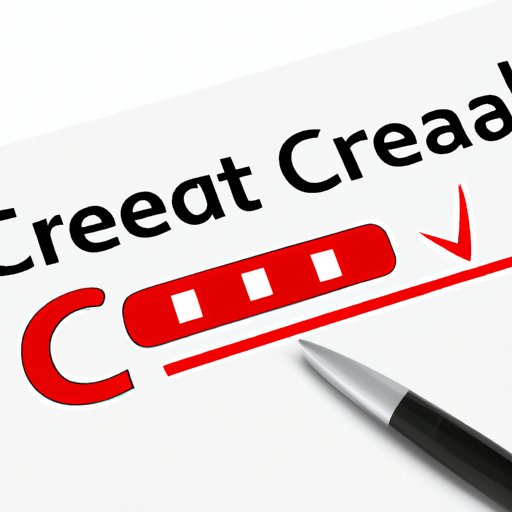
Introduction
Your credit score, a number between 300 and 850, is crucial in determining your creditworthiness. It is a reflection of your credit history, which lenders use to decide whether to approve your credit application, how much to lend you, and the interest rates you qualify for. Therefore, it’s essential to have a good credit score if you want to access credit, such as loans, credit cards, and mortgages. Fortunately, obtaining your credit score for free is possible. This article will discuss how to get your credit score for free without damaging your credit.

5 Simple Steps to Get Your Credit Score for Free
There are several methods to obtain your credit score without paying a dime. Here are five simple steps:
Step 1: Check if your bank or credit card issuer offers a free credit score
Many banks and credit card issuers provide free credit scores to their customers. Check with your bank to see if you are eligible for this service. The credit score may be updated monthly, and some banks also provide the credit report from one of the three credit bureaus.
Step 2: Sign up for a free credit monitoring service
Credit monitoring services provide free credit scores and credit reports from one or more credit bureaus. They alert you of changes to your credit file, such as new credit applications, changes in balances, or missed payments. Some popular credit monitoring services include Credit Karma, Credit Sesame, and Experian CreditWorks Basic.
Step 3: Use a free credit score website
Several websites provide free credit scores without requiring a credit card or subscription. These sites include Credit Karma, Credit Sesame, and Credit.com. Keep in mind that the scores provided may differ from those used by lenders, and they only offer the credit score, not the credit report.
Step 4: Request a free credit report from each of the three credit bureaus
You are entitled to a free credit report from each of the three credit bureaus, Equifax, Experian, and TransUnion, once every 12 months. You can request your reports at AnnualCreditReport.com, which is authorized by the government. The reports only include the credit history and not the credit score.
Step 5: Use a free credit counseling service
Non-profit credit counseling services provide free credit counseling, budgeting assistance, debt management plans, and credit scores. Some organizations include National Foundation for Credit Counseling (NFCC) and Consumer Credit Counseling Service (CCCS).
The Ultimate Guide to Obtaining Your Credit Score Without Paying a Dime
Now that we have discussed the five simple steps, let’s delve deeper into each of the methods and their pros and cons.
Bank or Credit Card Issuer
Getting your credit score from your bank or credit card issuer is convenient since you’re already a customer. It may also include additional features, such as credit alerts or personalized tips. However, the score provided may not be the same as the one used by lenders, and it may only be available to select customers with specific types of accounts or credit cards.
Credit Monitoring Services
Credit monitoring services are an excellent way to keep tabs on your credit report and score. They usually offer free trials that last up to 30 days, after which you may need to pay to continue using the service. Some drawbacks include the likelihood of receiving frequent credit offers, which may not be relevant to your credit needs and the scores may vary from those that lenders use.
Free Credit Score Websites
Free credit score websites usually partner with a credit bureau or financial institution to offer free credit scores to consumers. Unlike credit monitoring services, they don’t require a subscription or credit card information. The downsides are the credit score may differ from the one used by lenders, and they may not provide the credit report.
Annual Credit Report
Requesting your credit reports from AnnualCreditReport.com is the only way to get your credit report directly from the credit bureaus for free. It may help identify errors or fraud on your credit report. However, it only provides the credit history and may not include your credit score. You may also need to pay to access your credit score from the credit bureaus.
Non-Profit Credit Counseling Services
Non-profit credit counseling services offer free credit counseling, debt management plans, and budgeting assistance. They may also provide a free credit score, which may not be the same as what lenders use. A downside is that you may have to meet specific criteria to qualify for free services.
How to Check Your Credit Score Without Hurting Your Credit
Checking your credit score is essential, but it can also affect your score if done frequently or through the wrong method. There are two types of credit inquiries, a soft inquiry and a hard inquiry. A soft inquiry does not affect your credit score, while a hard inquiry can lower it by a few points. Here are some tips for checking your credit score without causing any damage:
- Use credit monitoring services or free credit score websites
- Request your credit report from AnnualCreditReport.com
- Limit hard inquiries by only applying for credit when necessary
- Spread out your credit inquiries over time
The Top 3 Websites to Get Your Credit Score for Free
Here are some of the best websites that offer free credit scores:
Credit Karma
Credit Karma provides free credit scores and credit reports from TransUnion and Equifax. They also offer financial tools, such as a debt repayment calculator and personalized recommendations to improve your credit score.
Credit Sesame
Credit Sesame offers free credit scores and credit reports from TransUnion along with personalized advice to achieve your financial goals. They also provide identity theft protection services and $50,000 in identity theft insurance.
Credit.com
Credit.com offers free credit scores and credit reports from Experian. They also provide educational resources, such as credit score explanations, credit repair solutions, and online quizzes.
Why You Should Check Your Credit Score Regularly and How to Do It for Free
Monitoring your credit score is essential in staying on top of your credit health. Here are some reasons why you should check your credit score regularly and how to do it for free:
- To detect identity theft or fraud
- To check for errors or inaccuracies on your credit report
- To monitor your credit utilization and payment history
- To track your progress in improving your credit score
Understanding the Importance of Your Credit Score and How to Access It Without Any Cost
Your credit score can significantly impact your financial well-being. A low credit score can lead to higher interest rates, difficulty obtaining loans, and even impact your ability to rent an apartment or get a job. On the other hand, a high credit score can reduce the cost of borrowing and increase the chances of getting your credit application approved. To access your credit score without any cost, use the methods discussed in this article.
Conclusion
In conclusion, obtaining your credit score for free is possible, and there are several methods to do so. Follow the steps outlined in this article or use one of the free resources listed to access your credit score without damaging your credit. Remember to check your credit score regularly to stay informed about your credit health.





